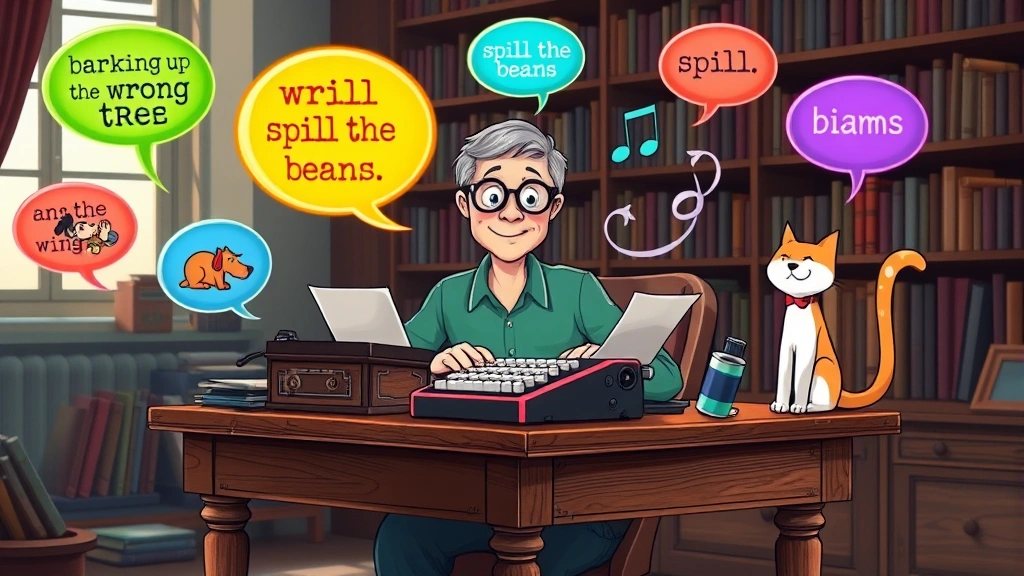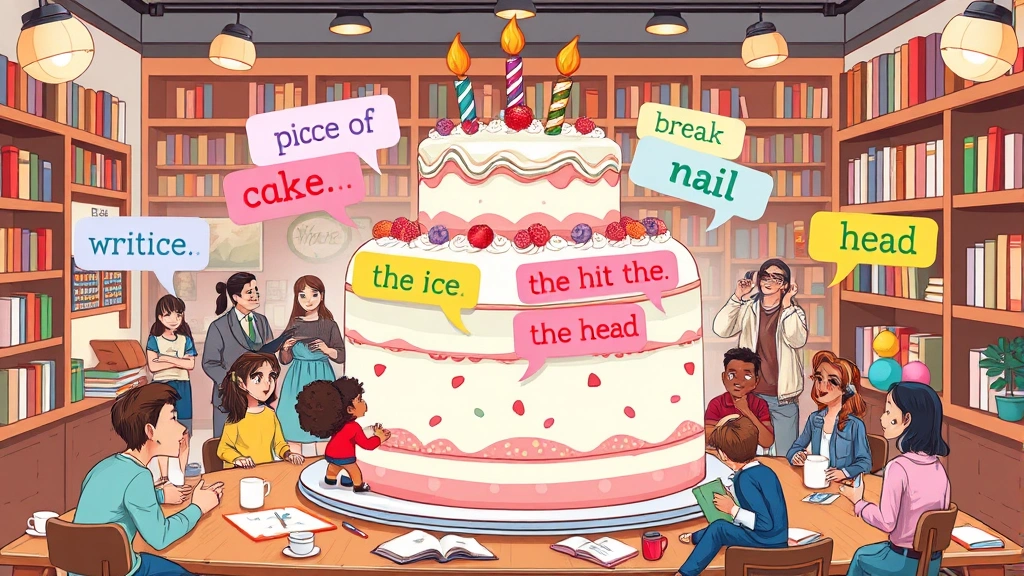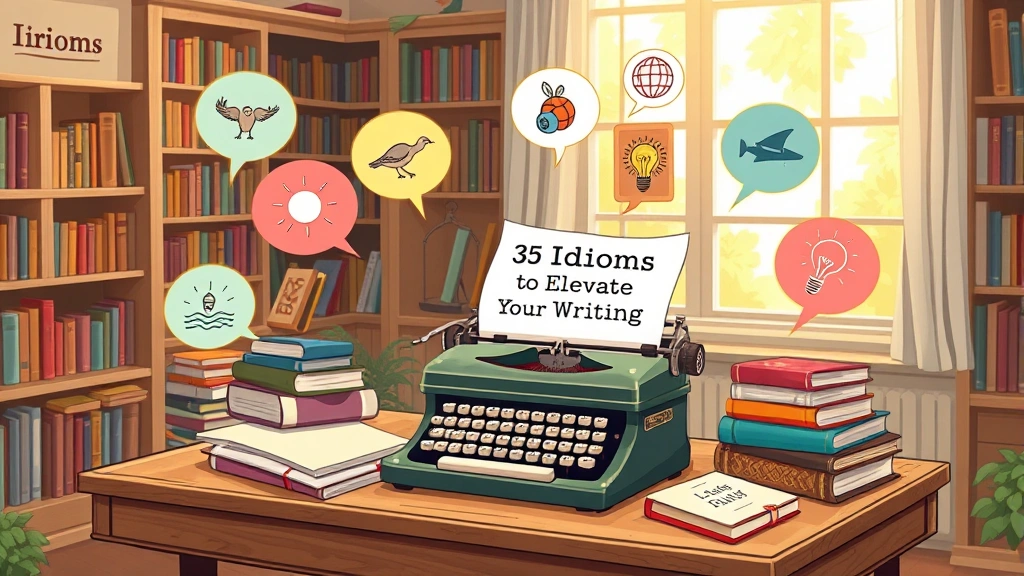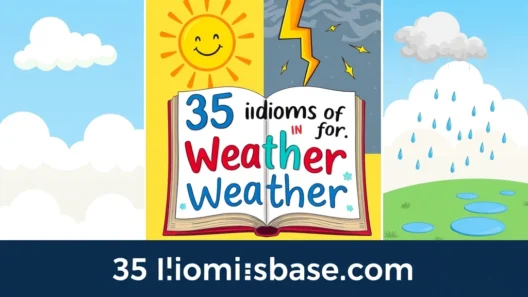Ever felt like your writing is missing that oomph? You know, that special something that makes your words sing and your readers lean in? Well, my friend, you're in for a treat! Imagine having a secret weapon that adds flavor, depth, and a touch of brilliance to every sentence you craft. That weapon? Idioms!
Idioms are like little pockets of wisdom and wit, ready to inject personality and vivid imagery into your prose. They're phrases where the meaning isn't obvious from the individual words, making them incredibly fun to use and even more delightful to encounter. Whether you're aiming to sound more natural, add humor, or just make your writing more memorable, idioms are your best pals.
Ready to dive into a treasure trove of linguistic gems? Let's unlock the power of 35 fantastic idioms that will transform your writing from good to great!
Why Bother with Idioms?
"But why should I use idioms?" you might ask. That's a fair question! Think of it this way:
- They add color and flair: Instead of saying something is "very easy," you can say it's "a piece of cake." See the difference? It paints a picture!
- They make your writing more natural: Native speakers use idioms all the time. Incorporating them makes your writing sound more authentic and less robotic.
- They show your reader you're in the know: Using idioms correctly can subtly signal your command of the language, building trust and credibility.
- They can distill complex ideas: Sometimes, an idiom can convey a nuanced meaning in just a few words, saving you space and making your point more powerfully.
Now, let's get to the good stuff!
35 Idioms to Elevate Your Writing
Here are 35 amazing idioms, perfect for spicing up your writing. We'll give you the idiom, its meaning, and a quick example to show you how to use it. Get ready to expand your linguistic toolkit!
Idioms for Describing Ease or Difficulty
-
A piece of cake
- Meaning: Very easy.
- Example: "Writing that report was a piece of cake after I did all the research."
-
To bite the bullet
- Meaning: To endure a difficult or unpleasant situation.
- Example: "I had to bite the bullet and work extra hours to finish the project on time."
-
To get the hang of something
- Meaning: To learn how to do something, especially something that is not obvious.
- Example: "It took a while, but I'm finally getting the hang of this new software."
-
To be in hot water
- Meaning: To be in trouble.
- Example: "After missing the deadline, he found himself in hot water with his boss."
Idioms for Success and Failure
-
To hit the nail on the head
- Meaning: To describe exactly what is causing a situation or problem.
- Example: "You hit the nail on the head with your analysis of the market trends."
-
To miss the boat
- Meaning: To lose an opportunity by being too slow to act.
- Example: "If you don't apply soon, you'll miss the boat on that scholarship."
-
To pass with flying colors
- Meaning: To pass something very easily and successfully.
- Example: "She studied hard and passed her exams with flying colors."
-
To go back to the drawing board
- Meaning: To start over again on a plan or idea because the previous attempt failed.
- Example: "Our first marketing strategy didn't work, so we have to go back to the drawing board."
Idioms for Communication and Understanding
- To spill the beans
- Meaning: To reveal a secret.
- Example: "Don't spill the beans about the surprise party!"

-
To get something off your chest
- Meaning: To talk about something that has been worrying you for a long time.
- Example: "I needed to get it off my chest, so I finally told him how I felt."
-
To beat around the bush
- Meaning: To avoid coming to the point; to speak indirectly.
- Example: "Stop beating around the bush and tell me what you really think."
-
To get your head around something
- Meaning: To understand something that is difficult or confusing.
- Example: "It's a complex theory, and I'm still trying to get my head around it."
-
To read between the lines
- Meaning: To understand the hidden meaning in what someone says or writes.
- Example: "You have to read between the lines to truly understand the author's message."
Idioms for Time and Urgency
-
To make hay while the sun shines
- Meaning: To make the most of an opportunity while it lasts.
- Example: "The market is booming, so let's make hay while the sun shines."
-
To jump on the bandwagon
- Meaning: To join something that is already popular or successful.
- Example: "Everyone is buying those new gadgets; I guess I'll jump on the bandwagon too."
-
To be behind the times
- Meaning: To be old-fashioned or not up-to-date.
- Example: "His business practices are a bit behind the times."
- To make up for lost time
- Meaning: To do something more quickly or more often to compensate for a period of inactivity.
- Example: "After being sick, she's trying to make up for lost time at work."
Idioms for Decisions and Consequences
-
To bite off more than you can chew
- Meaning: To take on a task that is too big or difficult to handle.
- Example: "He bit off more than he could chew by agreeing to manage two projects at once."
-
To cross that bridge when you come to it
- Meaning: To deal with a problem only when it arises, rather than worrying about it beforehand.
- Example: "I'm not going to worry about the presentation now; I'll cross that bridge when I come to it."
-
To call the shots
- Meaning: To be in charge or to make the important decisions.
- Example: "As the project manager, she calls the shots."
-
To cut corners
- Meaning: To do something in the easiest, quickest, or cheapest way, often by sacrificing quality.
- Example: "If you cut corners on the assembly, the product won't last."
Idioms for Emotions and Feelings
- To have a chip on your shoulder
- Meaning: To hold a grudge or feel resentful about something.
- Example: "He's always complaining; he seems to have a chip on his shoulder about his past."

-
To keep your chin up
- Meaning: To remain cheerful in a difficult situation.
- Example: "Things are tough, but try to keep your chin up!"
-
To feel under the weather
- Meaning: To feel slightly ill.
- Example: "I'm feeling a bit under the weather today, so I might go home early."
-
To have mixed feelings
- Meaning: To feel both positive and negative about something.
- Example: "I have mixed feelings about moving to a new city."
Idioms for Effort and Hard Work
-
To put your nose to the grindstone
- Meaning: To work hard and diligently.
- Example: "If you want to finish the novel, you need to put your nose to the grindstone."
-
To burn the midnight oil
- Meaning: To work late into the night.
- Example: "Students often burn the midnight oil before exams."
-
To pull your weight
- Meaning: To do your fair share of the work.
- Example: "Everyone needs to pull their weight for the team to succeed."
Idioms for General Situations
-
To break the ice
- Meaning: To do or say something to relieve tension or start a conversation in a social situation.
- Example: "A good joke can really help to break the ice at a networking event."
-
To add insult to injury
- Meaning: To make a bad situation even worse.
- Example: "First, my car broke down, and then, to add insult to injury, I got a parking ticket."
-
To be on the same page
- Meaning: To be in agreement or have the same understanding.
- Example: "Before we proceed, let's make sure we're all on the same page."
-
To take something with a grain of salt
- Meaning: To regard something as not completely true or accurate.
- Example: "Her stories are usually exaggerated, so take what she says with a grain of salt."
-
To get out of hand
- Meaning: To become out of control.
- Example: "The party started small, but it quickly got out of hand."
-
To hit the road
- Meaning: To leave; to begin a journey.
- Example: "It's getting late; we should hit the road."
-
To throw in the towel
- Meaning: To give up. (This idiom comes from boxing, where a corner man throws a towel into the ring to signal that his fighter is quitting.)
- Example: "Despite the challenges, she refused to throw in the towel."
How to Use Idioms Effectively in Your Writing

Using idioms is an art, not just a science! Here are a few tips to make sure you're using them like a pro:
Don't Overdo It
Imagine a cake with too much frosting – it can be overwhelming! The same goes for idioms. A few well-placed idioms can enhance your writing, but too many can make it sound forced, confusing, or even cliché. Aim for balance and sprinkle them in like precious spices.
Know Your Audience
Who are you writing for? If your audience isn't familiar with English idioms, using too many might leave them scratching their heads. For a global audience, choose more common and universally understood idioms, or be prepared to explain them subtly.
Ensure Correct Usage
An idiom's meaning isn't literal, and you can't usually change the words within it. For example, you can't say "a slice of cake" instead of "a piece of cake." Make sure you're using the idiom exactly as it's meant to be used. A quick search can confirm its correct form and meaning.
Vary Your Vocabulary
While idioms are fantastic, don't let them be your only tool. Continue to use a rich and varied vocabulary. Idioms should complement your existing writing style, not replace it.
Key Takeaways
So, what have we learned about these wonderful linguistic quirks?
- Idioms add personality: They make your writing more vivid, engaging, and reflective of natural language.
- They're shortcuts to meaning: Often, an idiom can convey a complex idea or emotion in just a few words.
- Context is king: Always consider your audience and the context of your writing when choosing an idiom.
- Practice makes perfect: The more you read and write, the more naturally idioms will flow into your vocabulary.
Frequently Asked Questions (FAQs)
Q1: What exactly is an idiom?
An idiom is a phrase or expression where the meaning cannot be understood from the ordinary meaning of its individual words. For example, "kick the bucket" doesn't literally mean to kick a bucket; it means to die. They are often figurative.
Q2: Are idioms appropriate for all types of writing?
Not always. Idioms are generally great for creative writing, informal articles, blog posts, and conversations because they add color and personality. However, in very formal or academic writing, scientific papers, or technical documents, they are usually avoided because they can be ambiguous or informal. Always consider your audience and the purpose of your writing.
Q3: How can I learn more idioms?
There are many ways!
- Read widely: Pay attention to how native speakers use idioms in books, articles, and online content.
- Listen actively: Watch English movies, TV shows, and podcasts. You'll hear idioms used in natural conversation.
- Use idiom dictionaries: There are many online and physical dictionaries dedicated to idioms.
- Practice: Try to incorporate one or two new idioms into your writing or conversation each week.
Q4: Can idioms make my writing confusing for non-native English speakers?
They can, yes, if used excessively or if you choose very obscure idioms. For a global audience, it's best to stick to more common idioms that are widely understood. If you use a less common one, consider adding a brief, subtle explanation or context to ensure clarity. The goal is to enhance, not obscure, your message.
Q5: Is there a difference between an idiom and a proverb or a cliché?
Yes, there are subtle differences:
- Idiom: A phrase where the meaning isn't literal (
e.g., "It's raining cats and dogs"). - Proverb: A short, well-known saying that expresses a general truth or piece of advice (
e.g., "Actions speak louder than words"). Proverbs often contain idioms, but they are complete sentences with a moral or lesson. - Cliché: An overused phrase or idea that has lost its original impact and originality (
e.g., "Think outside the box"). While some idioms can become clichés through overuse, not all idioms are clichés. The key is how frequently they are used.
Q6: How do I know if an idiom is "common" enough for a global audience?
This can be tricky! A good rule of thumb is to consider if the idiom is frequently used in popular media (movies, widely read news articles, common TV shows). If you have to pause and think about its meaning, or if it feels very specific to a particular region, it might be less common globally. When in doubt, err on the side of clarity or choose a more direct way to express your idea.
Ready to Write Like a Pro?
So there you have it – 35 fantastic idioms that are just waiting to be woven into your next masterpiece! Remember, writing is an adventure, and idioms are your trusty companions, ready to make your journey more colorful and exciting.
Don't be afraid to experiment, to play with words, and to let your creativity shine. Go forth, dear writer, and may your words always be as clear as crystal and as engaging as a good story! Which idiom are you most excited to try first? Let us know!






